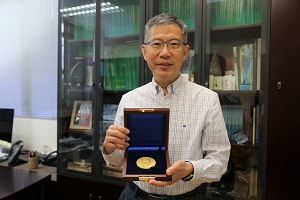| Jun 2021 Issue 16 | ||||||
 |
||||||
|
|
| News | |||||
| Professor Raymond Yeung Earns the IEEE 2021 Richard W. Hamming Medal | |||||
|
Prof. Yeung Wai-ho Raymond, Choh-Ming Li Professor of Information Engineering, and Co-Director of the Institute of Network Coding attended the virtual 2021 IEEE Vision, Innovation, and Challenges Summit (IEEE VIC Summit) and Honors Ceremony. Witnessed by top international engineers, entrepreneurs and innovators in the global technology industry, Professor Yeung received the “IEEE 2021 Richard W. Hamming Medal” for his fundamental contributions to information theory and pioneering network coding and its applications. It is the first time that home grown research in this area has been recognised at this level. The IEEE Awards Board citation says that his contributions “forever changed our understanding of network communication, impacting error-correction coding, information security, wireless communication, and data storage”. “It is an incredible honour to receive this award. Network communication has become an integral part of our daily life and I am grateful to be part of the advancement and evolution of our global network. My team and I will continue to explore new wireless network protocols as well as to maximise the applications of BATS code in various aspects including the Internet of Things (IoT), space and satellite communications, and many others, for the benefit of society,” said Professor Yeung. Professor Yeung is a world-renowned expert in information theory and co-founder of the field of network coding. His work on network coding provides the foundations of the field, which brings information theory, coding techniques, and networking systems together in an unprecedented way and influences generations of researchers. Fundamental contributions to information theory and pioneering network coding and its applications At the award ceremony, Professor Yeung conveyed his gratitude to his team, close collaborators, and students for their support, inspiration and being an integral part of his research life. “As a researcher, this journey is really an adventure, and I am very happy to be able to play a role in this exciting era of the Internet of Things.” In the late 1990s, Professor Yeung proposed the concept of network coding that revolutionised network communication. By applying coding to data packets inside the network, more information can be transmitted at a higher rate. In practice, this means people can download data faster, watch video streaming with less delay, and communicate more securely on the Internet. Professor Yeung and his team have further developed and spearheaded the use of the BATS, a network coding technology that solves the longstanding problem of packet loss in wireless multi-hop communication. Currently, his team is working with the Sustainable Lantau Office of the Civil Engineering and Development Department to apply the technology in a pilot trial to provide Wi-Fi service for hikers at a section of hiking trail in Lantau which is not well covered by the cellular network. Professor Yeung has also made foundational contributions to information theory. He introduced a geometrical framework for the entropy function in which he contemplated the existence of non-Shannon-type inequalities and discovered with his collaborator the first such inequality which is now known as the Zhang-Yeung inequality. This groundbreaking work proved the incompleteness of Shannon-type inequalities and opened a new frontier in information theory. Professor Yeung has received numerous awards for his research contributions, including the 2018 ACM SIGMOBILE Test-of-Time Paper Award and the 2016 IEEE Eric E. Sumner Award. He is a Fellow of the Hong Kong Institution of Engineers, the Hong Kong Academy of Engineering Sciences, and IEEE. He holds 10 patents on BATS codes. About IEEE Richard W. Hamming Medal IEEE Medals are the highest awards presented by the Institute of Electrical and Electronics Engineers (IEEE), the world’s largest technical professional organisation. The IEEE Richard W. Hamming Medal, established in 1986, is named in honour of Dr. Richard W. Hamming, who had a central role in the development of computer and computing science, and whose many significant contributions in the area of information science include his error-correcting codes. It is awarded to an individual or team for exceptional contributions to information sciences, systems, and technology. This article was originally published on CUHK Communications and Public Office website. |
|
||||
|
|
|||||
 |
|||||
|
|
|||||||||||||||||||||||



